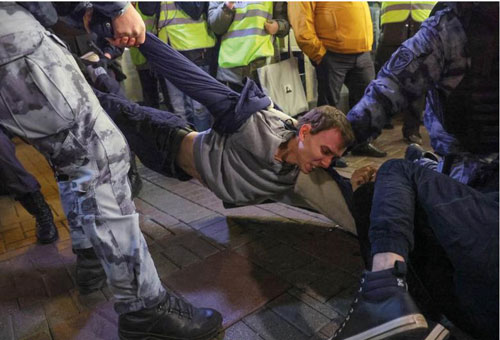Security forces detained more than 1,300 people in Russia on Wednesday at protests denouncing mobi-lisation, a rights group said, hours after President Vladimir Putin ordered Russia’s first military draft since World War Two.
The independent OVD-Info protest monitoring group said that according to information it had col-lated from 38 Russian cities, more than 1,311 people had been held by late evening.
Russian Interior Ministry official Irina Volk, in a statement quoted by Russian news agencies, said officers had cut short attempts to stage what it called small protests.
“In a number of regions, there were attempts to stage unauthorised actions which brought together an extremely small number of participants,” Volk was quoted as saying.
“These were all stopped. And those persons who violated laws were detained and taken to police stations for investigation and establish their respon-sibility.”
The reaction to the military mobilisation inside Russia has been unusually strong. The UK’s Ministry of Defence, commenting on the call-up in its Wednesday morning briefing, noted that the mobili-sation “is likely to be highly unpopular with parts of the Russian population”.
“Putin is accepting considerable political risk in the hope of generating much-needed combat power. The move is effectively an admission that Russia has exhausted its supply of willing volunteers to fight in Ukraine,” it said.
Even if successful, challenges remain – and it is unlikely new units will be ready for combat for several more months, the defence intelligence update said.
Russian officials insist the call-up will be limited to those who had completed military service, and fall short of widespread conscription.
But inside Russia, there is also speculation that the military mobilisation could be larger than formally announced.
The independent Novaya Gazeta newspaper, which moved its operations to Europe amid a post-war crackdown on media, reported that Vladimir Putin’s decree contains an additional paragraph which has been classified and kept secret.
The newspaper alleges that the secret paragraph allows for a call-up of up to a million people, rather than the reported 300,000, citing an unnamed gov-ernment source.—Agencies










